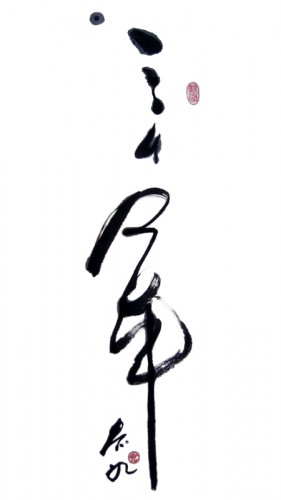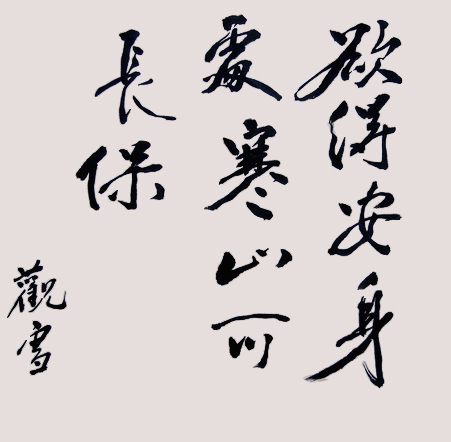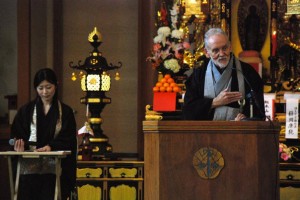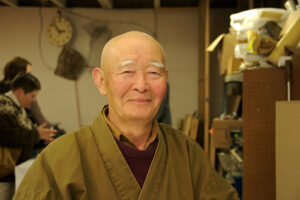
About Cold Mountain Zen
Our Story and Mission
Cold Mountain Zen is a 501(c)(3) non-profit corporation formed by members of the Rutgers University Zen community and New Jersey residents in 2010 to provide information about, and extended instruction in, Buddhist meditation in the tradition of the Rinzai school of Zen. The purpose of Cold Mountain Zen is to preserve and transmit the practice and teaching of Rinzai Zen Buddhism. To do so, CMZ will:
- Establish a residential center in New Jersey where ongoing Zen training and instruction will be offered;

- Offer Zen meditation to the general public in multiple locations
- Provide regularly scheduled meditation retreats (sesshin), which include talks on Zen practice and private interviews with the teachers
- Promote lay practice—offering dharma teachings to the wider community—and provide for priest training
- Engage in outreach to the public, vulnerable populations, and interfaith communities
- Model and teach practices of healthy and sustainable living
- Contribute to the growth of knowledge in the areas of Zen, Buddhism, meditation, and related arts of living
- Disseminate through publication and other means
information about Zen tradition, Buddhism, and meditation.
The roots of Cold Mountain Zen go back to ninth century China, and extend into the present day, through the work of Roshi Kurt Spellmeyer and the many individuals who participate in Zen activities at Rutgers University and satellite centers throughout New Jersey.
The Rinzai school of Zen is distinguished from other Buddhist traditions by its unique emphasis on “naturalness” or “the trusting mind” as a key element: through meditation people learn to trust who and what they naturally are. Meditation practice in the Rinzai school can be understood as a search for “harmony with nature’s order” or the liberation of the “true nature” within. Care of the self and care of the world—especially in an environmental sense—are intimately interconnected.
Cold Mountain Lineage
The Cold Mountain lineage belongs to the tradition of Japanese Zen, but it’s a rather unusual lineage. It began during the Ming Dynasty–the 17th century–when a group of monks from Mount Huangbo in China came to Japan and founded what is now called Obaku Zen. Obaku became the third Zen tradition in Japan, the other two being Rinzai and Soto Zen. At the time, the monks from China believed that they were simply bringing the latest form of Rinzai Zen, but in Japan it was treated as a separate school.
The leader of the Huangbo delegation was the great master Yinyuan Longqi (Ingen Ryuki), who had revived Zen practice in his native Fujian Province. The style of Zen he brought with him was different from the styles practiced in Japan at the time. The tendency among Japanese Buddhists was to divide rigidly along sectarian lines. Few Rinzai monks had contact with their Soto counterparts. Most Zen monks and nuns stayed away from the followers of the other Buddhist schools. The spirit of Chinese Rinzai Zen was much more flexible and all encompassing. It welcomed teachings from all the Chinese Zen school: the Guiyang, Caodong, Yunmen, and Fayan lines. It also made a place for the devotional practices of Pure Land Buddhism. This was the Zen that Yinyuan brought, and it remained very much a part of the Obaku tradition.
Along with Master Yinyuan’s delegation to Japan there was one lone monk who came from the Han Shan Si or “Cold Mountain Temple” in Suzhou. He went on to start a new temple in Japan, Kanjoji, in what is now Kameoka.
The Cold Mountain Temple in China gets its name from a famous Tang dynasty Zen poet Han Shan, “Cold Mountain,” who probably lived in the seventh century. A recluse in the Taishan mountains of southeast China, Han Shan wrote about the happiness and freedom of a life close to nature.
 I love the joys of the mountains,
I love the joys of the mountains,
wandering completely free,
feeding my crippled body another day,
thinking thoughts that go nowhere.
Sometimes I open an old sutra,
more often I climb a tower of stones
and peer down a thousand foot cliff
or stare up at swirling clouds,
where the windblown winter moon
looks like a crane, flying alone.
—Han Shan
Following the terrible years of World War II, the abbot of Kankjoji in Japan was Miyauchi Kanko. Together with his young American dharma heir, Kangan Glenn Webb, Miyauchi set out on a journey to the mother temple on the Chinese mainland. When they reached Han Shan Si, the master and his student were welcomed by the abbot, who acknowledged Webb’s transmission. Kangan Webb’s successor in the Cold Mountain lineage is Kurt Spellmeyer, Kankan Sensei, who trained with Takabayashi Genki and Kangan Webb at what was then known as the Seattle Zen Center. In 1985, Spellmeyer completed his training under Webb Roshi and was authorized to teach. He received the dharma name Kankan (Ch. Guan Han, “Sees the Cold”) in 1991. He directs Cold Mountain Zen in central New Jersey.
Kangan Webb’s successor in the Cold Mountain lineage is Kurt Spellmeyer, Kankan Sensei, who trained with Takabayashi Genki and Kangan Webb at what was then known as the Seattle Zen Center. In 1985, Spellmeyer completed his training under Webb Roshi and was authorized to teach. He received the dharma name Kankan (Ch. Guan Han, “Sees the Cold”) in 1991. He directs Cold Mountain Zen in central New Jersey.
Cold Mountain Zen’s History
 The community now known as Cold Mountain Zen began in 1994 as an informal meditation group that met on the Rutgers University campus under the supervision of Kurt Spellmeyer, a Rinzai Buddhist priest (osho) and Professor of English at Rutgers. As interest in meditation grew, Professor Spellmeyer added more and more sessions, and then over the years, added meditation instruction and practice at other locations in central New Jersey. As interest grew and participants became more adept, Professor Spellmeyer offered 5-day and 7-day meditation intensives, first at his home in Plainfield, New Jersey, and then, as the numbers grew, at the Murray Grove Retreat and Conference Center in Lanoka Harbor.
The community now known as Cold Mountain Zen began in 1994 as an informal meditation group that met on the Rutgers University campus under the supervision of Kurt Spellmeyer, a Rinzai Buddhist priest (osho) and Professor of English at Rutgers. As interest in meditation grew, Professor Spellmeyer added more and more sessions, and then over the years, added meditation instruction and practice at other locations in central New Jersey. As interest grew and participants became more adept, Professor Spellmeyer offered 5-day and 7-day meditation intensives, first at his home in Plainfield, New Jersey, and then, as the numbers grew, at the Murray Grove Retreat and Conference Center in Lanoka Harbor.
Over the last 16 years of Cold Mountain Zen, Professor Spellmeyer—or Spellmeyer Roshi—has trained a number of students who have themselves become extremely advanced practitioners of Zen meditation. These students have now begun to assist him in the teaching of meditation and in the conduct of intensive meditation retreat
Cold Mountain Zen’s Future
One goal is to create a residential Zen center in the vicinity of Rutgers University, and to continue offering meditation on a regular basis in the mornings and the evenings. Ideally the center will include spaces for instruction, not only in Zen meditation but also in yoga, chi-gung, tai-chi, calligraphy, ikebana (flower arrangement), chado (tea ceremony), vegetarian cooking, and other Zen arts. While some people might find the practice of seated meditation (zazen) uncongenial, they can appreciate Zen as a philosophy of life and often discover that the Zen arts offer them mental training in a form more readily integrated into their everyday lives.
Over the longer term, another goal of Cold Mountain Zen is to establish a rural residential training center that will become a school for instruction on Zen and sustainability in its many aspects—environmental, psychological, cultural, and economic. The facility that we envision would include land under organic cultivation, a water treatment plant, and a solar energy plant. Farm work would become an integral part of the training offered during retreats, which will extend for much longer periods than 5 or 7 days. Traditionally, the Buddhist training year is divided into three or four ango or kessei, 90-day periods that balance work with formal meditation. Although modern life makes such extended stays difficult for many people, a growing number of retirees, combined with young people transitioning from college to their long-term careers, have begun to embrace ango as a crucial rite of passage.
But the most important passage we all face is the one that must lead from our current way of life to a future more closely integrated with the natural world. No one who reviews our current situation—defined by massive species loss, climate change and environmental degradation—can avoid concluding that our economy is fundamentally unsustainable. But even though thoughtful people everywhere understand the problem, change proceeds at a glacial pace because no rival value system has emerged to replace the older one. We believe, however, that Rinzai Zen can help create a real alternative to a culture based on competitive consumption. If, as we believe, the word “enlightenment” describes a relation between us and the world which is defined by mutual care, then Cold Mountain Zen has role to play in the future of our society.
Cold Mountain Zen, Inc. is a 501(c)(3) not-for-profit established with the mission to provide for the preservation and transmission of the teaching and practice of Rinzai Zen Buddhism in New Jersey.

